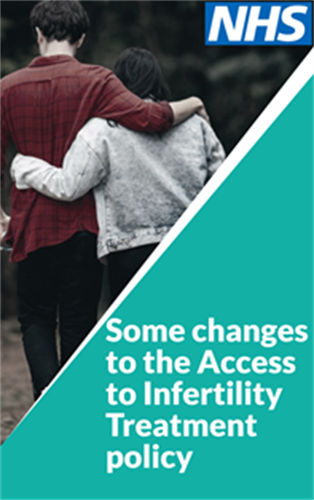Putting Barnsley people first...

Access to infertility treatment

Proposed changes to our joint Access to Infertility Treatment policy
Clinical Commissioning Groups (CCGs) in the Yorkshire and Humber area are considering some changes to our shared approach to supporting people who are experiencing infertility to access specialist interventions to help them conceive.
A joint commissioning policy was developed in partnership with the Yorkshire and Humber Expert Fertility Panel (a panel predominantly made up of clinicians and fertility experts) and adopted in 2013. Recently, CCGs across the Yorkshire and the Humber agreed to work together again to update this policy in light of new NICE guidance and other policy changes.
The shared policy sets out who is eligible for specialist fertility services.
This shared policy is not about how many cycles of infertility treatments are paid for by individual CCGs. This is covered by each CCG’s own local policy around funding of specialist infertility treatment.
The new policy contains some changes. The majority of these are simple changes to wording. These will either make the policy easier to read or reflect changes to clinical terminology as infertility treatment develops. These small changes will not affect how couples may be eligible for treatment.
However, there are five changes that might affect whether a couple may be eligible for NHS funded specialist fertility treatment.
The proposed changes:
Eligibility of Overseas Visitors
Changes to the NHS (Charges to Overseas Visitors) Regulations 2015 were introduced into Parliament on 19 July 2017. As a result, from 21 August 2017, assisted conception services are no longer included in the scope of services. This means those people who need to pay the NHS surcharge are no longer eligible for NHS funded assisted conception, this includes initial fertility investigations.
Where one partner has a different immigration status to the other, treatment will not be funded if one partner is not eligible as the policy applies as a couple. So, if either of the couple has to pay the immigration health surcharge, they will not be eligible for NHS funded specialist infertility treatment.
Transgender Couples
The definition of infertility has been explicitly amended to include transgender which will broaden access to NHS funded specialist infertility treatment to transgender couples.
The following items, included in the current policy for people registered with a Barnsley GP, are now included in the new proposed policy across the Yorkshire and Humber area.
Same Sex Couples
The new policy will give same sex couples access to NHS funded IUI and DI (Artificial Insemination and Donor Insemination) which increases access to treatment for same sex couples.
Couples living with a disability that affects their fertility
The new policy enhances the offer of funding to couples who by reason of disability cannot conceive naturally.
Need to be smoke free
In order to be eligible for NHS funded specialist fertility treatment, couples must be able to demonstrate they have been smoke free for at least three months. This will be confirmed with a carbon monoxide breath test.
This change is based on national guidance about how smoking has a negative effect on the chances of successful IVF treatment.
- You can view the full new proposed (draft) policy here
- The current policy can be found here
- Read a leaflet summarising the changes here
Have your say - Now Closed
The closing date for comments was 6 October 2019.
Your views will help inform our decision as we consider whether to adopt the new policy. Further information on what people told us and what happens next will be published in this page.
